NATO is answerable to Kiev and to the world
Ukrainian President Zelensky’s remarks about NATO’s abandonment of Ukraine make complete sense as Russian aggression is an outcome of a well-built action plan that didn’t come out of the blue.
Total Views |
Falling to the immense international pressure that sighted the NATO to respond responsibly as well as impactful, the North Atlantic Treaty Organization activated its response forces in assistance to Ukraine on Feb 26, two days after the heavily armed conflict surged. NATO's response is so far being considered as a historic move, an unprecedented decision by NATO that is highly capable of turning the tables? But will it really work this way? Only if NATO is really trying to selflessly provide assistance to the war-struck Ukraine! And is that really what’s happening?
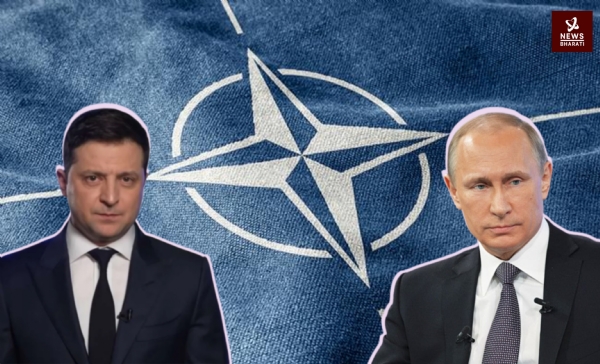
NATO’s ‘historic’ response comes after Ukrainian President Volodymyr Zelensky was forced to helplessly declare that the war struck country is all alone in their fight against Moscow. Zelensky had remarked, "We are alone in defending our country. Who is ready to defend us together with us? Honestly, I don't see any. Who is ready to give Ukraine a guarantee of joining NATO? Honestly, everyone is afraid." Zelensky’s words express the depth of betrayal that Ukraine felt after the world, mainly NATO, abandoned the country. The pretty promises that NATO had diplomatically put forth to Ukraine for the long lasting period prior to the recent surge of conflict, had clearly started to fade away.
At the same time, for NATO it was not wrong to not practically interfere in the Russo - Ukrainian conflict and help out Ukraine, since they are bound by Article 5 of the treaty. What makes it ugly for NATO, is their consideration of Ukraine as an aspiring member and being engaged with the country on the same lines since a considerable period. This particular relationship that has existed among the NATO countries and Ukraine, justified Zelensky’s expectations of aid and assistance from NATO, during the ongoing crisis. On the contrary, NATO’s response, until its ‘historic decision’, kept on pushing it more towards a villainous position in the entire play. Now that NATO has prepared its response force to tackle the situation, will there really be a difference?
NATO’s Response Force and US
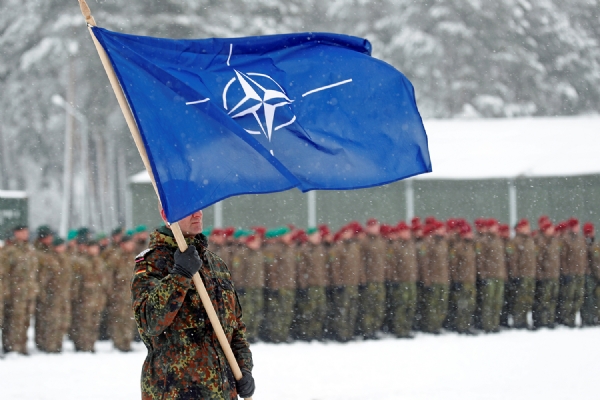
Based on the reports of international media, the activation of NATO’s response troops doesn’t imply that they will go into Ukraine because the country is yet not a member of the organization. It is important to note that adding to NATO’s decision, US President Joe Biden has stated that US troops are being deployed to Eastern Europe in order to help bolster NATO countries that are losing confidence about the impact of Russia's aggressive actions. He also made it clear that these forces, however, will not be fighting in Ukraine.
General Tod Wolters, NATO's Supreme Allied Commander Europe, said in a statement, "This is a historic moment and the very first time the Alliance has employed these high readiness forces in a deterrence and defense role. They represent a flexible, combat credible force that can be employed in multiple ways and we are utilizing their inherent agility.”
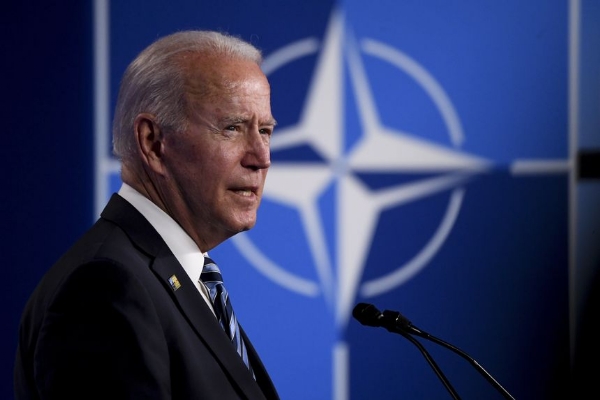 He further added that, "These deterrence measures are prudent and enhance our speed, responsiveness and capability to shield and protect the one billion citizens we swore to protect (refers to the population of NATO countries)." The force has not yet deployed but is on standby. It's not clear how many troops the response force will contain. So at least, for now, the picture continues to remain the same that Ukraine is all by itself in its struggle against Russia.
He further added that, "These deterrence measures are prudent and enhance our speed, responsiveness and capability to shield and protect the one billion citizens we swore to protect (refers to the population of NATO countries)." The force has not yet deployed but is on standby. It's not clear how many troops the response force will contain. So at least, for now, the picture continues to remain the same that Ukraine is all by itself in its struggle against Russia.
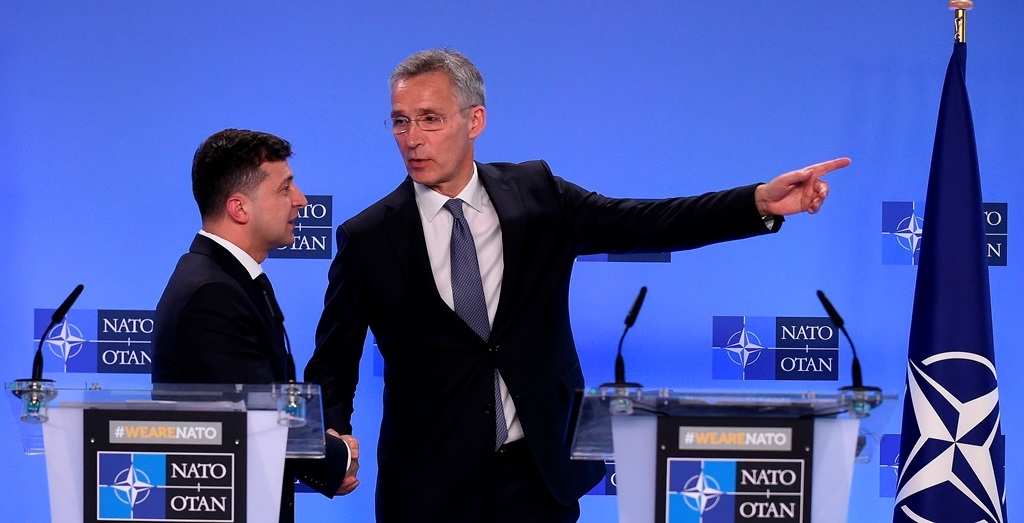 .
Article 5 of the North Atlantic Treaty
.
Article 5 of the North Atlantic Treaty
According to the North Atlantic Treaty, Article 5 refers to the principle of collective defence, which is at the very heart of NATO’s founding treaty. It remains a unique and enduring principle that binds its members together, committing them to protect each other and setting a spirit of solidarity within the Alliance.
Collective defence means that an attack against one Ally is considered as an attack against all Allies. The principle of collective defence is enshrined in Article 5 of the Washington Treaty. NATO invoked Article 5 for the first time in its history after the 9/11 terrorist attacks against the United States. NATO takes credit to have taken collective defence measures on several occasions, including in response to the situation in Syria and the Russian attack on Ukraine in 2014.
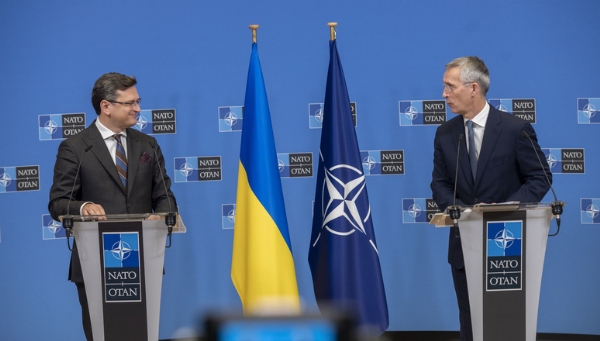
The article also defines the scope and reputation of its standing forces and states;
“Collective defence measures are not solely event-driven. NATO has a number of standing forces on active duty that contribute to the Alliance’s collective defence efforts on a permanent basis. They perform different tasks ranging from exercises to operational missions, in peacetime and in periods of crisis and conflict.”
In the recent statement that came after NATO announced the deployment of its special response forces against Moscow, NATO Secretary General Jens Stoltenberg has said, “NATO stands in solidarity with Ukraine and NATO allies are imposing severe costs on Russia for the reckless invasion of Ukraine. NATO allies, in close coordination with the European Union and other partners all over the world, are now imposing severe economic sanctions on Russia.”
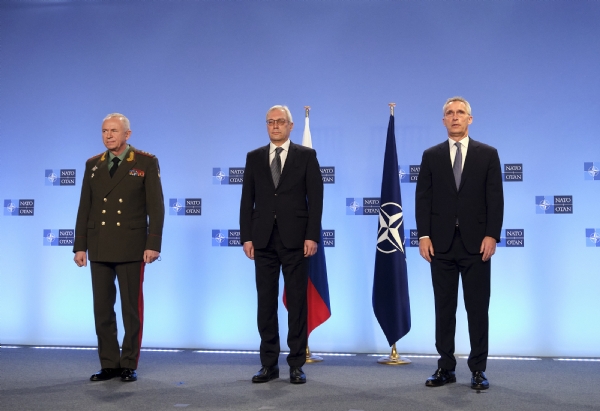
He further added, “NATO allies have also over a long period of time provided support, practical support, military support to Ukraine and helped them to build a much stronger, much better equipped, much better trained armed force today than Ukraine had in 2014.”
At this point of time, no matter how much ever NATO tries to stress that they are bolstering the Ukrainian forces against Russia, it cannot be denied that NATO and Ukraine are on two different pages. The kind of assistance that NATO is providing is definitely helpful, but Ukraine is in need of much more than just that. Ukraine needs NATO to provide on field armed strengthening to the war stricken country, which NATO wouldn’t provide until they include Ukraine as a legitimate member of the organization. And that doesn’t seem to be in picture for a considerable period.
Zelensky’s remarks about NATO’s abandonment of Ukraine make complete sense as Russian aggression is an outcome of a well-built action plan that didn’t come out of the blue. NATO had always been in a position to take hold of the situation and stop the destruction between the two countries, even today, only if it did what it was supposed to. But with how the organization is tackling the crisis, their motive seems more to bully and corner Russia than it is to help and save Ukraine from the crisis.

NATO’s ‘historic’ response comes after Ukrainian President Volodymyr Zelensky was forced to helplessly declare that the war struck country is all alone in their fight against Moscow. Zelensky had remarked, "We are alone in defending our country. Who is ready to defend us together with us? Honestly, I don't see any. Who is ready to give Ukraine a guarantee of joining NATO? Honestly, everyone is afraid." Zelensky’s words express the depth of betrayal that Ukraine felt after the world, mainly NATO, abandoned the country. The pretty promises that NATO had diplomatically put forth to Ukraine for the long lasting period prior to the recent surge of conflict, had clearly started to fade away.
At the same time, for NATO it was not wrong to not practically interfere in the Russo - Ukrainian conflict and help out Ukraine, since they are bound by Article 5 of the treaty. What makes it ugly for NATO, is their consideration of Ukraine as an aspiring member and being engaged with the country on the same lines since a considerable period. This particular relationship that has existed among the NATO countries and Ukraine, justified Zelensky’s expectations of aid and assistance from NATO, during the ongoing crisis. On the contrary, NATO’s response, until its ‘historic decision’, kept on pushing it more towards a villainous position in the entire play. Now that NATO has prepared its response force to tackle the situation, will there really be a difference?
NATO’s Response Force and US

Based on the reports of international media, the activation of NATO’s response troops doesn’t imply that they will go into Ukraine because the country is yet not a member of the organization. It is important to note that adding to NATO’s decision, US President Joe Biden has stated that US troops are being deployed to Eastern Europe in order to help bolster NATO countries that are losing confidence about the impact of Russia's aggressive actions. He also made it clear that these forces, however, will not be fighting in Ukraine.
General Tod Wolters, NATO's Supreme Allied Commander Europe, said in a statement, "This is a historic moment and the very first time the Alliance has employed these high readiness forces in a deterrence and defense role. They represent a flexible, combat credible force that can be employed in multiple ways and we are utilizing their inherent agility.”

Biden said NATO was staying unified to stand up to Putin's threats to international peace and security. In an official Press statement Pentagon Press Secretary John F. Kirby has said that "We're going to do everything that we need to do to defend our country, and as the President has said, we're going to do what we need to do to defend every inch of NATO territory — and we take those obligations seriously." The US President has tried to make it as clear as he can that the United States is concerned with Ukraine’s ongoing crisis as long as it is an international threat and indirectly acknowledged that America has no plans of nosing in the European conflict. Evidently, there’s no hope of assistance for Ukraine from the US, at least in the present context
 .
.According to the North Atlantic Treaty, Article 5 refers to the principle of collective defence, which is at the very heart of NATO’s founding treaty. It remains a unique and enduring principle that binds its members together, committing them to protect each other and setting a spirit of solidarity within the Alliance.
Collective defence means that an attack against one Ally is considered as an attack against all Allies. The principle of collective defence is enshrined in Article 5 of the Washington Treaty. NATO invoked Article 5 for the first time in its history after the 9/11 terrorist attacks against the United States. NATO takes credit to have taken collective defence measures on several occasions, including in response to the situation in Syria and the Russian attack on Ukraine in 2014.

The article also defines the scope and reputation of its standing forces and states;
“Collective defence measures are not solely event-driven. NATO has a number of standing forces on active duty that contribute to the Alliance’s collective defence efforts on a permanent basis. They perform different tasks ranging from exercises to operational missions, in peacetime and in periods of crisis and conflict.”
In the recent statement that came after NATO announced the deployment of its special response forces against Moscow, NATO Secretary General Jens Stoltenberg has said, “NATO stands in solidarity with Ukraine and NATO allies are imposing severe costs on Russia for the reckless invasion of Ukraine. NATO allies, in close coordination with the European Union and other partners all over the world, are now imposing severe economic sanctions on Russia.”

He further added, “NATO allies have also over a long period of time provided support, practical support, military support to Ukraine and helped them to build a much stronger, much better equipped, much better trained armed force today than Ukraine had in 2014.”
At this point of time, no matter how much ever NATO tries to stress that they are bolstering the Ukrainian forces against Russia, it cannot be denied that NATO and Ukraine are on two different pages. The kind of assistance that NATO is providing is definitely helpful, but Ukraine is in need of much more than just that. Ukraine needs NATO to provide on field armed strengthening to the war stricken country, which NATO wouldn’t provide until they include Ukraine as a legitimate member of the organization. And that doesn’t seem to be in picture for a considerable period.
Zelensky’s remarks about NATO’s abandonment of Ukraine make complete sense as Russian aggression is an outcome of a well-built action plan that didn’t come out of the blue. NATO had always been in a position to take hold of the situation and stop the destruction between the two countries, even today, only if it did what it was supposed to. But with how the organization is tackling the crisis, their motive seems more to bully and corner Russia than it is to help and save Ukraine from the crisis.


